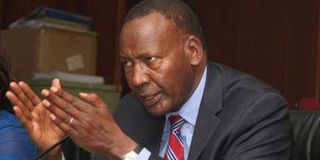CS Joseph Nkaissery calls for tough laws to tame hate speech

Interior Cabinet Secretary Joseph Nkaissery, who on August 9, 2016 warned that bloggers spreading hate messages on social media could trigger poll violence. FILE PHOTO | WILLIAM OERI |
What you need to know:
- According to speakers, hate speech is widespread and could become worse as the elections draw close.
- Mr Mucheru said legislation such as the Cyber Crime Bill is being formulated to regulate social media.
Interior Cabinet Secretary Joseph Nkaissery has warned that bloggers spreading hate messages on social media could trigger election-related violence in the run-up to 2017 polls.
Mr Nkaissery told a Joint Cohesion Committee of the Senate and National Assembly that other threats to national peace are politicians fuelling hatred and vernacular stations that spread divisive messages.
“We need to come up with legislation to curb the threats posed by unnecessary hate messages coming out of these platforms especially now that we are headed to an election year,” he said on Tuesday.
A top-level delegation led by Mr Nkaissery, Information Communication and Technology CS Joe Mucheru and Inspector-General of Police Joseph Boinnet attended the meeting.
POLITICIANS GREATER OFFENDERS
Others were National Cohesion and Integration Commission chairman Francis Kaparo, Independent Electoral and Boundaries Commission (IEBC) chairman Issack Hassan and Director of Public Prosecutions (DPP) Keriako Tobiko.
The meeting, chaired by Tarbaj MP Mohamed Elmi, was held to find ways of ensuring the country does not plunge into electoral violence as witnessed in 2008.
According to speakers, hate speech is widespread and could become worse as the elections draw close.
Statistics provided by the DPP indicate that politicians form a majority of those charged in 19 cases currently in courts and five others that are under investigations.
Mr Keriako and Director of Criminal Investigations Ndegwa Muhoro said “politicisation of hate speech” is a major obstruction when investigating politicians.
“Once you arrest a person from one side of the political divide, you are expected to arrest another one from the other side so as to appear balanced. Never mind that this other person may not have engaged in criminal activity,” said Mr Tobiko.
PUBLIC SYMPATHY
The two also appeared to blame the Judiciary for slapping offenders with light sentences and bail, which they often paid and on being released, started hurling hate messages right within the precincts of the court, according to the DPP.
The IEBC chairman called for punitive measures commensurate with the “rewards” the politicians appeared to realise on uttering hate speech, saying they became more popular, were likely to get more votes and voters’ sympathy unlike sanctions the offences attracted.
A call by Mr Kaparo for the government to show “courage” and shut down some of the social media platforms if they became a threat to social cohesion was resisted by Mr Mucheru, who said the platforms were beneficial to society in exchanging ideas and understanding each other.
“You cannot enjoy the freedom of expression and speech when you are dead. You need to be alive to enjoy such freedoms,” said Mr Kaparo, expressing the enormity of the threat.
Mr Mucheru said legislation such as the Cyber Crime Bill is being formulated to regulate social media.
Mr Elmi said the joint team would hold a workshop to come up with legislative proposals to curb hate-mongering.





